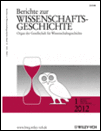
Berichte zur Wissenschaftsgeschichte
Scope & Guideline
Fostering Interdisciplinary Dialogue in Science History
Introduction
Aims and Scopes
- Interdisciplinary History of Science:
The journal emphasizes an interdisciplinary approach, integrating perspectives from history, philosophy, sociology, and cultural studies to explore the evolution of scientific practices and knowledge. - Cultural and Social Contexts of Science:
It investigates how scientific knowledge is shaped by and shapes cultural and social dynamics, focusing on the interplay between science and societal changes. - Memory and Remembrance in Science:
A core area includes the study of memory and cultural remembrance within scientific communities, examining how history is constructed and the implications for contemporary scientific practices. - Visual Cultures in Science:
The journal explores the role of visual representations in science, including the circulation of images and their impact on public perception and scientific communication. - Historical Epistemology:
It features discussions on historical epistemology, analyzing the development of scientific knowledge and its implications for modern scientific practices. - Global Perspectives on Knowledge:
The journal addresses global histories of science, paying attention to the contributions of diverse cultures and the transnational exchanges that shape scientific discourse.
Trending and Emerging
- Cultural Memory and Remembrance:
Recent publications highlight the importance of cultural memory in science, examining how historical narratives are constructed and the implications for present-day scientific practices. - Visual Representation in Science:
The exploration of visual cultures and their impact on science is gaining traction, indicating a growing recognition of the importance of images in shaping scientific discourse and public understanding. - Interdisciplinary Approaches to Historical Epistemology:
There is an increasing emphasis on interdisciplinary approaches that combine history, philosophy, and sociology, demonstrating a trend towards a more holistic understanding of scientific knowledge. - Global Histories and Transnational Perspectives:
The journal is increasingly focusing on global histories of science, reflecting a trend towards recognizing the contributions of diverse cultures and the transnational nature of scientific development. - Science and Public Engagement:
Emerging themes include the relationship between science and public perception, particularly how scientific knowledge is communicated and received in society, underscoring the importance of public engagement in science.
Declining or Waning
- Traditional Biographical Studies:
There seems to be a waning interest in traditional biographical studies of individual scientists, as the journal increasingly favors thematic and interdisciplinary analyses over singular narratives. - Focus on Localized Scientific Practices:
Papers centered on localized or isolated scientific practices are becoming less frequent, possibly due to the journal's shift toward more global and interconnected narratives. - Historical Narratives of Specific Scientific Disciplines:
There is a noticeable decline in articles that focus solely on the histories of specific scientific disciplines in isolation, as the journal trends towards more integrative studies that connect various fields.
Similar Journals

History of Geo- and Space Sciences
Bridging the gap between history, philosophy, and geo-sciences.History of Geo- and Space Sciences is a distinguished open-access journal published by COPERNICUS GESELLSCHAFT MBH since 2010, committed to advancing knowledge in the interdisciplinary fields of Earth and planetary sciences as well as the history and philosophy of science. Based in Germany, this journal operates under ISSN 2190-5010 and E-ISSN 2190-5029, providing a platform for researchers, professionals, and students to disseminate and access high-quality scholarly articles. With a remarkable impact reflected in its 2023 Scopus rankings, placing it in Q3 for Earth and Planetary Sciences (miscellaneous) and Q2 for History and Philosophy of Science, the journal plays a crucial role in fostering dialogue and collaboration among the scientific community. It not only covers significant advancements in geo-sciences but also addresses historical perspectives and philosophical inquiries that shape our understanding of the discipline. Engage with groundbreaking research and broaden your insights by contributing to or reading articles from this pivotal journal.
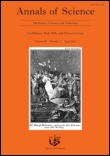
ANNALS OF SCIENCE
Delving Deep into the Roots of Scientific InquiryANNALS OF SCIENCE, published by Taylor & Francis Ltd, is a pivotal journal in the field of the History and Philosophy of Science, as evidenced by its Q3 categorization and a respectable Scopus rank of 99 out of 223, placing it in the 55th percentile among its peers. With a rich history dating back to its initial publication in 1936, the journal has made significant contributions to scholarly discourse, providing a platform for researchers and academics to explore the intricate connections between scientific developments and philosophical inquiries. The journal's commitment to rigorous academic research ensures that it remains a vital resource for professionals, educators, and students dedicated to understanding the evolution of scientific thought. Although it operates under traditional subscription models, the journal's importance in shaping modern scientific discussions cannot be overstated, making it an essential read for those engaged in the multifaceted study of science's history and philosophical implications.
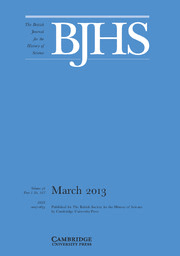
BRITISH JOURNAL FOR THE HISTORY OF SCIENCE
Exploring the intricate dance between science and society.The British Journal for the History of Science is a premier academic publication dedicated to exploring the intricate relationship between science and society throughout history. Published by Cambridge University Press, this journal features a rich blend of original research articles, critical reviews, and scholarly discussions that illuminate the development of scientific ideas and practices from antiquity to the modern era. With a strong reputation reflected in its Q1 classification in History and Q2 in History and Philosophy of Science for 2023, this journal plays an essential role in advancing the field by engaging researchers, professionals, and students alike. The journal's commitment to intellectual rigor and cross-disciplinary dialogue fosters a deeper understanding of how scientific thought has shaped our world. Although it does not offer open access, the journal maintains a strong academic footprint, making significant contributions to historical scholarship. Join a community of scholars who are passionate about unfolding the rich tapestry of scientific history, as the British Journal for the History of Science continues to publish cutting-edge research until 2024.

Revista Colombiana de Filosofia de la Ciencia
Exploring the Intersection of Philosophy and ScienceRevista Colombiana de Filosofia de la Ciencia, published by UNIV EL BOSQUE, stands as a pivotal platform for the dissemination of knowledge in the field of philosophy of science. With a commitment to open access since 2010, this journal not only enhances the accessibility of crucial scholarly work but also encourages collaboration and dialogue among researchers, professionals, and students alike. Featuring an ISSN of 0124-4620 and an E-ISSN of 2463-1159, the journal fosters critical discussions on the implications and underpinnings of scientific thought, promoting an enriched understanding of how philosophical frameworks can shape scientific practices. The journal aims to bridge disciplines, inspiring new research pathways while contributing to the philosophical discourse surrounding science in Latin America and beyond. This dedication places the Revista Colombiana de Filosofia de la Ciencia as a leading voice in its field, making it an essential read for anyone looking to deepen their engagement with the philosophy that informs scientific investigation and theory.
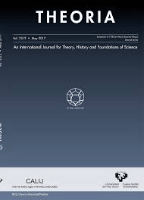
THEORIA-REVISTA DE TEORIA HISTORIA Y FUNDAMENTOS DE LA CIENCIA
Elevating Understanding of Science's Historical RootsTHEORIA-REVISTA DE TEORIA HISTORIA Y FUNDAMENTOS DE LA CIENCIA, published by the Servicio Editorial Universidad del País Vasco, is a leading open access journal dedicated to advancing the fields of History, Philosophy of Science, and related disciplines since its inception in 2003. With a robust impact factor placing it in the esteemed Q1 and Q2 quartiles in its respective categories, this journal serves as a crucial platform for researchers, professionals, and students who are engaged in profound discussions and analyses of scientific foundations and historical contexts. Based in Spain, THEORIA has consistently demonstrated its commitment to scholarly excellence, achieving notable rankings in Scopus, particularly in the fields of Arts and Humanities, where it holds a rank of #169 in Philosophy and #59 in History and Philosophy of Science. The journal not only allows immediate open access to its diverse range of articles, fostering global knowledge dissemination, but also aims to bridge connections across varied philosophical inquiries and historical explorations within science. Join the dialogue today in shaping the future understanding of our scientific heritage.

Nuncius-Journal of the History of Science
Illuminating the Past, Inspiring Future InquiryNuncius - Journal of the History of Science, published by BRILL, is a vital resource dedicated to the exploration and analysis of the intricate relationship between science and its historical context. Established with the goal of fostering scholarly discussion, this journal serves as a platform for researchers and historians to present their findings and interpretations regarding the evolution of scientific thought. With an impact factor reflective of its academic rigor and ranked in the Q3 category in the field of History and Philosophy of Science, it offers a rich archive of articles spanning converged years from 1986 to 2024. Nuncius encourages submissions that advance the understanding of science's impact on society, culture, and its philosophical underpinnings, making it a key reference for those engaged in the histories that define modern scientific inquiry. Situated in the scholarly landscape of the Netherlands, Nuncius remains an essential read for professionals, students, and academics seeking to deepen their knowledge in this significant field.

Dynamis
Advancing Scholarly Dialogue in Science and MedicineDynamis is a distinguished journal published by EDITORIAL UNIV GRANADA, focusing on the interdisciplinary fields of History and Philosophy of Science as well as Medicine. Since its inception in 1981, this journal has provided a platform for scholarly discussion and exploration of the evolution of scientific thought and medical practices, with a consistent commitment to enriching academic dialogue up to the year 2024. Operating within the Q4 category for both History and Philosophy of Science and Medicine in the 2023 rankings, it holds a unique niche despite its positioning and aims to amplify underrepresented voices and perspectives via rigorous academic analysis. Although not currently an open-access publication, Dynamis continues to serve as a vital resource for researchers, professionals, and students who are keen to understand the historical contexts and philosophical implications in these fields. Its impact within the academic community is reflected in its Scopus rankings, offering valuable insights into the interplay between history, philosophy, and medicine. Situated in beautiful Granada, Spain, Dynamis remains committed to fostering a deeper understanding of the sciences through a historical and philosophical lens.

Notes and Records-The Royal Society Journal of the History of Science
Revealing the Threads of Scientific ProgressNotes and Records - The Royal Society Journal of the History of Science is an esteemed scholarly journal published by the Royal Society in the United Kingdom, focusing on the historical aspects of science and its impact on modern scientific practices. With an ISSN of 0035-9149 and E-ISSN 1743-0178, this journal serves as a vital platform for researchers, professionals, and students who seek to explore the intricate connections between historical developments and contemporary scientific discourse. Recognized for its academic rigor, it holds a commendable position in the Q3 category of the History and Philosophy of Science field, ranking #56 out of 223 according to Scopus, and showcasing a 75th percentile ranking. Covering converged years from 1970 to 1973 and from 1975 to 2024, the journal publishes articles that contribute significantly to the understanding of the evolution of scientific thought. While it currently does not operate under an open access model, its esteemed content continues to engage a broad readership, fostering a deeper appreciation for the history behind scientific innovation and inquiry.
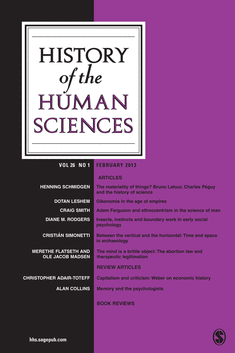
HISTORY OF THE HUMAN SCIENCES
Navigating the Complexities of Human ExperienceHISTORY OF THE HUMAN SCIENCES is a prestigious journal published by SAGE PUBLICATIONS LTD, dedicated to advancing the field of human sciences through multidisciplinary scholarship. With an ISSN of 0952-6951 and an E-ISSN of 1461-720X, this journal has been a cornerstone of research since its inception in 1988 and continues to address significant themes in history and philosophy of science. The journal boasts an impressive Q1 ranking in both History and History and Philosophy of Science categories as of 2023, underlining its impact and relevance in the academic community. Although not an open-access journal, it provides a wealth of scholarly articles that encourage critical dialogue and foster innovative thinking among researchers, professionals, and students alike. Located in the United Kingdom, the journal is committed to exploring the complexities of human experience and knowledge across varied contexts, making it an essential resource for anyone dedicated to understanding the historical dimensions of science and its philosophical implications.

ARCHIVE FOR HISTORY OF EXACT SCIENCES
Charting the Historical Pathways of Exact SciencesARCHIVE FOR HISTORY OF EXACT SCIENCES, published by Springer, is an esteemed journal committed to promoting the understanding of the historical and philosophical dimensions of exact sciences, including mathematics and its application to various scientific fields. With a heritage dating back to 1964, this journal not only maintains a robust academic reputation in Germany but also reaches an international readership, reflected in its Scopus rankings, where it holds a commendable position in the 71st percentile for History and Philosophy of Science. The journal presently falls within Q3 and Q4 quartiles for its respective categories in 2023, highlighting its ongoing relevance and contribution to academia. As researchers, professionals, and students seek to explore the intricate relationships between mathematics, philosophy, and history, ARCHIVE FOR HISTORY OF EXACT SCIENCES serves as a key resource, fostering interdisciplinary dialogue and stimulating new inquiries in the complex landscape of science.